The effects and implications of the war in Ukraine on European enlargement policy are the subject of the full text available for download. Further articles deal with narratives about EU-Turkey relations in the European Council, the importance of the topic of migration in the Brexit debate and the "early warning system" for subsidiarity control by national parliaments. A call for transnational lists in EU elections and a collective review on democratic crises in the EU address how the EU can restructure itself internally
‘Zeitenwende’ for Europe: A momentum for enlargement policy of the European Union?
Funda Tekin
There is currently momentum to put the European Union's (EU) enlargement policy as a whole to the test and, where necessary, to fundamentally reform it. This article aims to identify, contextualise and analyse the relevant points of reference in order to contribute to this relevant and long overdue debate. It conceptually explores what the mobilising arguments for EU enlargement are. Based on this, an assessment of the new applications for EU membership by Ukraine, Georgia and the Republic of Moldova will be made, also with a view to the accession procedures already underway. Finally, the concept of differentiated integration is discussed as a possible solution.
Turkey on the agenda of the European Council: membership perspectives, interests, and conflicts
Moritz Rau, Denise Ersoy and Wolfgang Wessels
Relations between the EU and Turkey have been highly topical in recent years. Growing hostilities, political turmoil and verbal skirmishes have kept this partnership in the limelight and aroused heated discussions in academic, political and public debate. Turkey’s backsliding democracy and shift towards a more assertive foreign policy in Syria, Libya and the Eastern Mediterranean have largely contributed to the EU’s perception that ‘Turkey is increasingly moving away from the Union’. Yet, Turkey is still an accession candidate country and remains a ‘key partner for the EU’ in a number of policy areas – such as migration, trade and security cooperation as part of the NATO partnership. Aiming to shed light on this contradicting framework of EU-Turkey relations, this chapter studies European Council conclusions since the 1970s, focussing on narratives about Turkey generated by the EU leaders – the Heads of State or Government of the member states. The analysis examines Turkey in its roles as a candidate country, as a transactional partner and as a problematic neighbour from an EU perspective.
Ten years of “early warning system” in the European Union: an effective instrument of subsidiarity control?
Andres Wimmel
After having played a minor role in European politics for a long time, national parliaments were empowered to “guardians of subsidiarity” under the Lisbon Treaty. This article scrutinizes whether they have succeeded in influencing European Union legislation with reasoned opinions over the past ten years. A statistical analysis of all opinions up to 2020 shows that the Commission recalls draft legislative acts significantly more often after receiving at least one reprimand. A comparison of the parliamentary chambers suggests that these withdrawal decisions were not driven by strategic considerations such as a member state's voting weight in the Council. Both indicate that the “Early Warning System” works better in practice than previously assumed. This result should encourage members of national parliaments to make more active use of this instrument of subsidiarity control.
Migration as a divisive issue for the European Union? Lessons from the Brexit process
Christian Schweiger
The United Kingdom’s exit from the EU in January 2020 marks a historic milestone in the European integration process. For the first time since its foundation the EU faces the existential question if the specific domestic political factors of Brexit have the potential to contribute towards the further disintegration of the Union. Migration stood at the heart of the campaign as the core issue in the public referendum conducted in June 2016. The British debate on migration took place in the context of the growing British scepticism towards the ability to combine the primacy of national sovereignty and political self-determination with the membership of the EU system of multi-level governance. The analysis presented here considers multiple factors through which migration as an issue contributed towards the narrow decision in favour of Brexit in the British EU referendum on 23 June 2016. As such it acts as an important case study for the analysis of disintegrative tendencies in the tension between national sovereignty and the supranational polity of the EU.
Reconciling electoral equality and degressive proportionality: EU-wide proportional compensation through transnational lists
Manuel Müller
The principle of “degressive proportionality” in European elections ensures that even the smallest member states are adequately represented in the European Parliament. However, it is detrimental to transnational electoral equality: votes cast in small countries have greater weight and thus distort the relative strength of political parties. Is it possible to reform European electoral law in a way that preserves the degressive-proportional representation of member states, but at the same time makes sure that the seat share of each parliamentary group corresponds to its EU-wide vote share? The “tandem model” proposed by Jo Leinen and Friedrich Pukelsheim ostensibly fulfils this goal, but at the price of strong distortions within the national constituencies. A more promising model to reconcile electoral equality and degressive proportionality would be proportional compensation through transnational lists.
Downloads & sources
Team & authors
 Share publication
Share publication










